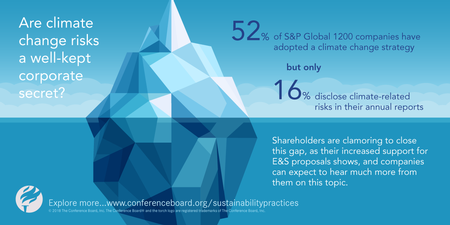Sustainability Reporting: Quality over Quantity
07 Feb. 2018 | Comments (0)
Corporate sustainability reporting—the disclosure of environmental, social, and governance (ESG) practices—continues to transition from an exercise in transparency to a more targeted and strategic mechanism for companies to engage with stakeholders. Rather than broadening the scope of their disclosure, companies are increasingly urged to report on sustainability practices that are more relevant and material to their specific lines of business.
This transition is resulting in higher-quality data that are enabling investors and other stakeholders to make better informed decisions about companies' full range of risks and opportunities.
For instance, recent analysis by The Conference Board reveals that sustainability report assurance—the practice of using third-party verification for data in a company's sustainability report—is now used by almost 40 percent of S&P Global 1200 companies.
Despite the increase in the quality of sustainability disclosure, there continues to be much room for improvements in transparency. For example, even though the World Economic Forum has listed "extreme weather events" among the top two global risks in terms of likelihood for the past five years, only 16 percent of S&P Global 1200 companies are disclosing the risks that climate change poses to their businesses. The Iow levels of climate risk disclosure are driving increased shareholder activity on this topic, and companies can expect to face growing pressure from investors to improve disclosure of climate-related risks.

Companies in the studied sample are also lagging on the diversity side. Only 28 percent of S&P Global 1200 companies disclose the ratio of women to men in management.
What is more, across the studied sample, the median percentage of women holding management positions has remained fairly flat over the last few years: less than 1 in 4 management positions are held by women.
These are some of the findings from The Conference Board Sustainability Practices Dashboard, a comprehensive database and online benchmarking tool. The dashboard captures the most recent disclosure of environmental and social practices by large public companies around the world and segments them by market index, geography, sector, and revenue group. The Dashboard and the Key Findings report can be accessed on this page: www.conference-board.org/sustainabilitypractices
-
About the Author:Thomas Singer
The following is a biography of former employee/consultant Thomas Singer is a former principal researcher in corporate leadership at The Conference Board. His research focused on corporate social res…




0 Comment Comment Policy